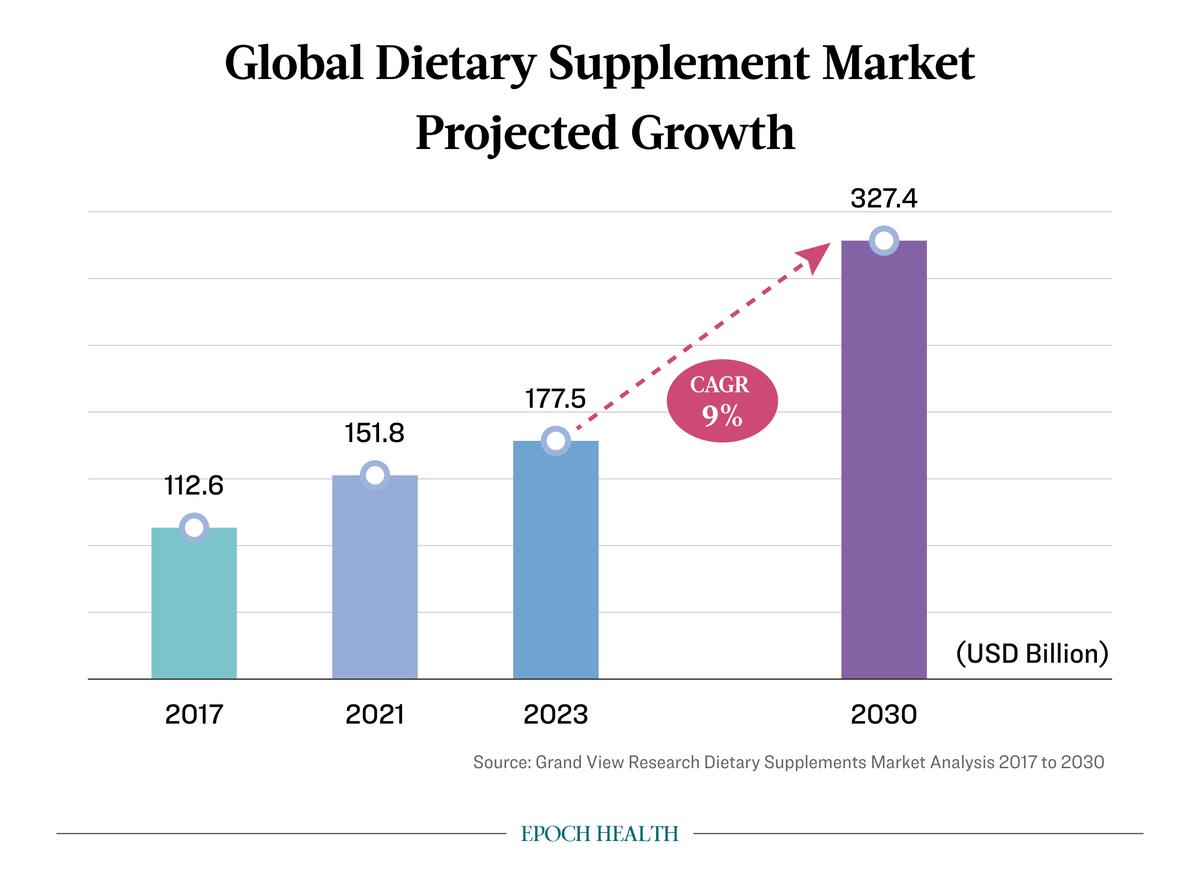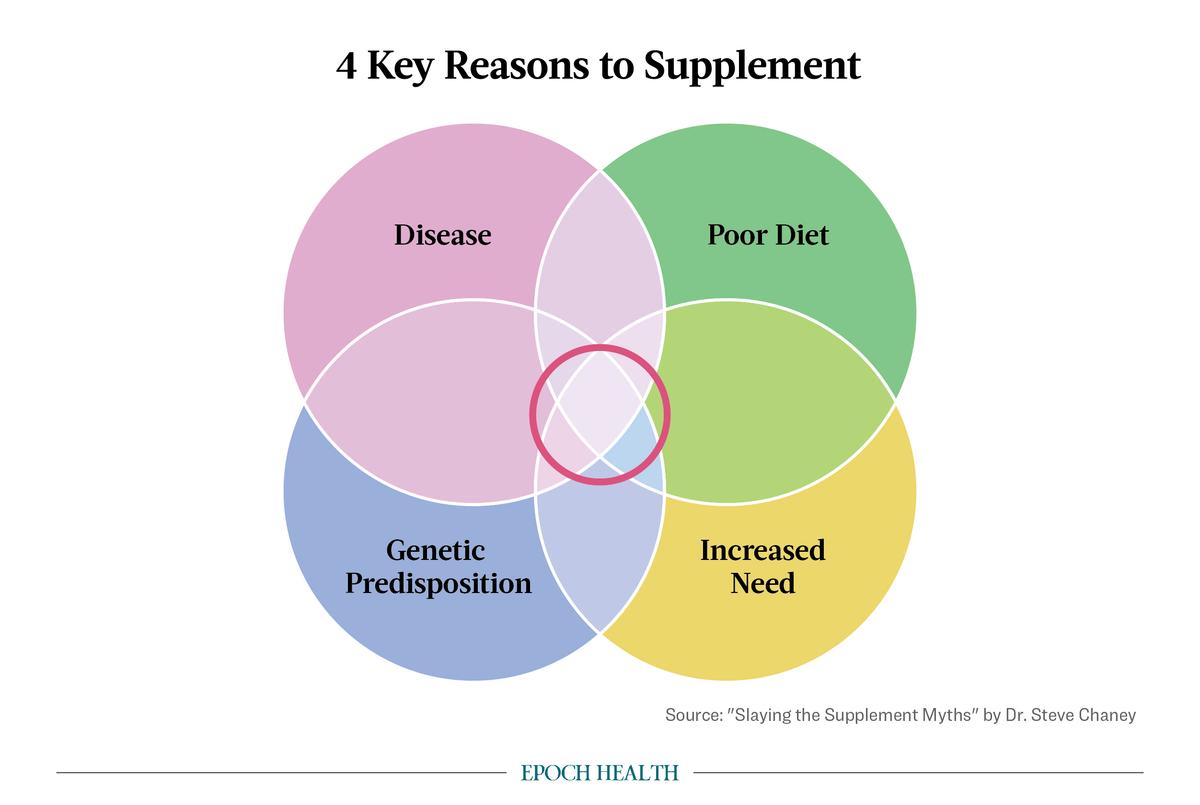The dietary supplement market is booming and probably won’t be slowing down anytime soon. Whether it’s to fill nutritional gaps in our diets or to manage a particular health issue, Americans continue to load up on pills, powders, liquids, gummies, and bars, hoping for better health.

With a shift toward self-directed care, consumers have become more focused on preventive health care and are opting for more nutraceuticals over prescription drugs. While much of this growth will come from established categories, a large percentage is expected to be from entirely new product lines.
What’s Driving the Demand?
The 2023 CRN Consumer Survey on Dietary Supplements shows that most people use supplements to fill nutritional gaps, support a healthy lifestyle, and optimize their overall health.“Dietary supplements have become a non-negotiable component of so many Americans’ health habits—and this year’s survey data illustrates a consumer who recognizes that dietary supplements are vital to living the life they want to live,” said CRN president and CEO Steve Mister.
Poor Nutrition
The U.S. Centers for Disease and Prevention (CDC) reports that 6 in 10 Americans have a chronic disease, and 4 in 10 have two or more. Chronic disease is the leading cause of death and disability in the United States, with an annual health care cost of $4.1 trillion. Poor nutrition is considered a critical lifestyle risk.Lack of Micronutrients
A significant dietary problem today is a lack of micronutrients despite adequate and even excessive caloric intake. Some call it “hidden hunger” because the food grown today using current farming practices doesn’t contain adequate vitamins, minerals, and protein needed to prevent chronic disease.“Most of the items sold in a grocery store you couldn’t make in your kitchen,“ chiropractic doctor and nutritional consultant Nathalie Matte told The Epoch Times. ”I call it ‘fake food’ because real foods don’t have preservatives to make them last longer.”
Mass Food Production
In the late 19th century, U.S. culture and farming technologies began to change drastically. Americans were turning to convenience foods instead of home-cooked meals, and farming shifted away from small operations aimed at feeding families and communities to consolidating and maximizing the yield from a few crops for storage and export.Loss of Farming Diversity
The modernization and mechanization of agriculture also accelerated the loss of diversity of American farms. It became a common practice to no longer raise livestock on the same farms where crops were grown. Without animal manure to provide nutrients to crops, synthetic fertilizer was needed.4 Key Reasons to Supplement
Many people are turning back to nature to find solutions to treat ailments without relying on pharmaceuticals—an industry that has managed to shackle our health to their multibillion-dollar empire. Yet drugs have often failed to address the underlying causes of disease by simply suppressing our symptoms.“You should always look for the root cause of your symptoms and listen to your body,” Ms. Matte said.
1. Poor Diet
Today’s standard American diet lacks calcium, magnesium, and vitamins A, D, E, and C. Taking a multivitamin may help with some of these deficiencies, although calcium, magnesium, and vitamin D may need further supplementation. Further, specialized diets such as vegan, Paleo, and keto create specific nutritional deficiencies that may require supplementation.2. Increased Need
Various life stages, certain medications, and lifestyle habits can significantly affect the body’s nutritional requirements.For instance, obstetricians often recommend that pregnant or lactating women supplement their diet with folic acid, iron, vitamin D, and other vital vitamins and minerals. Those advancing in age often require more protein, calcium, vitamin D, and vitamin B12.
Loop diuretic medications used to treat fluid overload conditions increase urination, which can deplete potassium and magnesium, two essential electrolytes for healthy heart function.
3. Genetic Predisposition
In his book, Dr. Chaney explains how genetic factors affect nutritional needs, a concept known as nutrigenomics. Although it is an emerging science requiring more investigation and information, existing studies show that some people are more at risk than others for nutritional deficiencies because of their genetic makeup.4. Disease
Chronic disease, surgery, and trauma require one to optimize his or her nutritional status. Additionally, populations at risk for disease can benefit from supplementation. Dr. Chaney states in his book, “Supplementation may reduce disease risk in people at high risk for disease, especially if their diet is inadequate.”To determine the need for supplementation, Dr. Chaney created a Venn diagram showing the similarities and differences between categories. “The more overlapping circles you have, the more likely you are to benefit from supplementation,” he said.

Choosing Quality Supplements
Choosing supplements can be difficult for consumers, and thorough research into the product is necessary to ensure quality. The U.S. Food and Drug Administration (FDA) only regulates dietary supplements as food, not drugs, and considers them a product to supplement the diet. Unlike drugs that must be proven safe and effective before marketing, supplements only need their manufacturer’s verification for identity, purity, strength, and composition, according to the FDA’s Current Good Manufacturing Practice (CGMP) regulations.The FDA doesn’t require a standardization process to ensure batch-to-batch consistency of the products and identify specific chemicals or markers that qualify for product consistency or product control.
Dr. Chaney pointed out that quality-control tests are expensive, and many supplement companies don’t bother with them and will put a product on the shelves anyway. Although quality issues have resulted in lawsuits and trouble with the FDA, this is still a serious problem in the industry.
Finding quality supplements takes asking tough questions, said Dr. Chaney, including asking how many quality-control tests they run and what kinds of tests they run.
Knowing the number of tests is essential since the industry standard is to test for about 105 pesticides. However, the best companies use Pesticide Analytical Manual (PAM) screening, which is more expensive but screens for 325 pesticides.
- Does the company perform DNA testing for the authenticity of the raw ingredients and non-GMO claims?
- Does it use high-performance liquid chromatography/mass spectrometry (HPLC/MS) testing? This analytic method identifies and quantifies the final product’s chemical composition and ensures it contains the correct amount of active ingredients without contaminants. Many companies forego this test because of cost.
- Does it use inductively coupled plasma/mass spectrometry (ICP/MS) testing, a highly sensitive elemental testing technique to detect heavy metal contamination? This test costs supplement companies even more than HPLC/MS testing, and it is rarely used.
- Does it test for microbial contamination?
- If the product doesn’t meet specifications, what does the company do with it?
Exercise Common Sense
If you’re taking prescription medications, it’s essential to talk to your doctor before starting a supplement program to avoid interactions. For instance, vitamin K increases blood clotting, which could cause an unwanted reaction if you’re taking a blood thinner.Another supplement, St. John’s wort, speeds up the breakdown of some medications and reduces their effectiveness. Sometimes, adjusting when you take a supplement is all that’s needed to avoid interactions.
The Bottom Line
Dr. Chaney’s “Bottom Line” recommendations include the following:- Ignore the hype. Be wary of promises like effortless weight loss. Don’t fall for glowing testimonials without good scientific support; the placebo effect can be as high as 50 percent.
- Ignore the negative myths. “There is no convincing evidence that supplements don’t work or may harm you.”
- Your doctors aren’t trained as scientists; they don’t have time to analyze the scientific literature thoroughly. When giving nutritional advice, they often merely repeat the urban nutrition myths they’ve heard.
- Since most of us don’t have perfect diets, supplements can help fill the gaps. Most experts would agree with this general premise.
- A holistic approach to supplementation is always best. Look for supplements that mimic the balance found in whole foods.
- The most substantial evidence of the beneficial effects of supplementation is seen in those with a nutrient deficiency, increased needs, a genetic predisposition, and those at a higher risk of disease.
- Many people are unaware when they’re at high risk for disease. For example, the first symptom of heart disease can be sudden death.
- One day, we may be able to predict an individual’s nutritional needs based on their genetics (nutrigenomics). However, we are not there yet. “If someone tries to tell you otherwise, they will probably lie about other things as well.”
- “Finally, claims that supplementation is useless or harmful are no more tenable than claims that supplementation offers magic cures. Both are myths and should be disregarded.”









